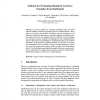Free Online Productivity Tools
i2Speak
i2Symbol
i2OCR
iTex2Img
iWeb2Print
iWeb2Shot
i2Type
iPdf2Split
iPdf2Merge
i2Bopomofo
i2Arabic
i2Style
i2Image
i2PDF
iLatex2Rtf
Sci2ools
73
Voted
AIED
2015
Springer
2015
Springer
Methods for Evaluating Simulated Learners: Examples from SimStudent
We discuss methods for evaluating simulated learners associated with four different scientific and practical goals for simulated learners. These goals are to develop a precise theory of learning, to provide a formative test of alternative instructional approaches, to automate authoring of intelligent tutoring systems, and to use as a teachable agent for students to learn by teaching. For each goal, we discuss methods for evaluating how well a simulated learner achieves that goal. We use SimStudent, a simulated learner theory and software architecture, to illustrate these evaluation methods. We describe, for example, how SimStudent has been evaluated as a theory of student learning by comparing, across four domains, the cognitive models it learns to the hand-authored models. The SimStudent-acquired models generally yield more accurate predictions of student data. We suggest future research into directly evaluating simulated learner predictions of the process of student learning.
Related Content
| Added | 14 Apr 2016 |
| Updated | 14 Apr 2016 |
| Type | Journal |
| Year | 2015 |
| Where | AIED |
| Authors | Kenneth R. Koedinger, Noboru Matsuda, Christopher J. MacLellan, Elizabeth A. McLaughlin |
Comments (0)

